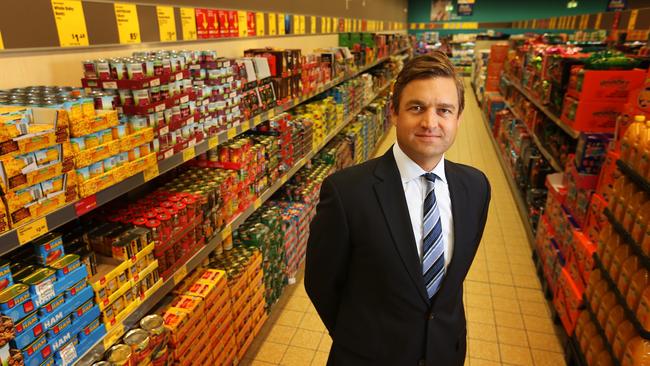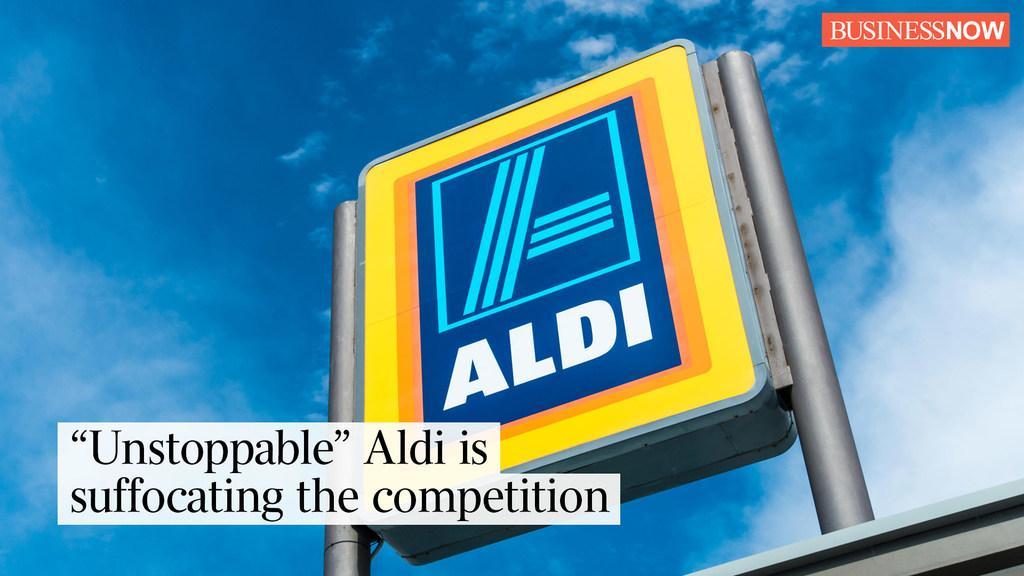Aldi launches biggest brand overhaul in 16 years, vows to maintain price leadership or ‘we’re dead’
IT’S the biggest complaint of most Aldi customers, but the CEO says it’s been fixed — and is asking for a second chance.

IF CHECKOUT queues ever put you off from shopping at Aldi, chief executive Tom Daunt is asking for a second chance.
As the German discount chain spends hundreds of millions of dollars revamping its nearly 470 stores around the country, Mr Daunt says fixing bottlenecks at the checkout has been one of his three key priorities.
Speaking to news.com.au on a tour of Aldi’s refurbished Waterloo store in inner-Sydney, Mr Daunt said wait times were no longer the number-one complaint from customers. “Not anymore, I challenge you on that,” he said in a rare interview.
“There are times, particularly on a Wednesday morning or a Saturday morning when we release our Special Buys, you can queue. But if we’ve got five or six registers a store and every one is open, there’s not a lot more we can do about that.
“As a general rule, we’re trying to focus on a few different things. If customers, generally speaking, come into clean and tidy stores, get what they came to get, and don’t have to wait to get out, this is 95 per cent of customers happy.
“But we’re not changing who we are. You still have to put $2 in a trolley, still have to pack your own bags, still have to buy the 15c bag — there are quirks of Aldi that are just always going to be different.”
And customers shouldn’t expect Aldi to introduce self-service check-outs any time soon. “I know they’re becoming very popular, of course we have considered them,” Mr Daunt said.
“We just prefer to put a human face on the register and have very efficient registers. On balance we think that’s better. Our registers are designed to be fast — it’s one of the things people comment on. Some complain, some get very competitive about it, but it’s an experience going through an Aldi register.”
Aldi is launching its biggest brand campaign since opening its first Australian store in 2001, dropping its “Smarter Shopping” slogan for “Good Different”, a phrase that will “underpin all aspects of the Aldi business, from product sourcing, to supplier relationships and the customer experience”.
Aldi says its key point of difference — and the most important thing for its customers — is pricing and has vowed to maintain that position.
“On some aspects of our range the discounts are enormous,” Mr Daunt said. “Our fly spray is 60-70 per cent cheaper than Mortein. But if you assemble a basket of items, ours will always come out cheaper, typically somewhere between 25-40 per cent.”
Mr Daunt said Aldi was determined to wear the impact of rising energy costs to maintain a price advantage over Coles and Woolworths, after Woolies CEO Brad Banducci warned it was like “trying to outrun a bear”.
He said Aldi had last year decreased prices on 603 products out of its range of 1450, while increasing prices on just less than 200. In the first quarter of this year, Aldi has spent $75 million on lowering prices on an annualised basis.
“Will electricity push up prices?” he said. “I’m stating the obvious, but only if you push up prices. They’re pushing up costs, no question. Electricity is one of the largest costs that grocery retailers have, they’re impacting our costs as well.
“The biggest difference between us and our competition is we have a very, very lean business and low costs of operation, so I would expect the impact of electricity price rises is greater on our competitors.”
He pointed out one of the benefits of being a privately owned company was greater flexibility to reinvest profits into the business.
“Our strategy has been to take the benefits of scale, so as we grow we become more profitable, but instead of taking more and more profits we have deliberately invested that back, into improving the store environment, the range, lowering prices and a little bit into service.
“Most retailers will look around the market and say, ‘What’s the most I can charge for this?’ We look at our business and say, ‘Here’s what the product costs, what’s the least I can charge and still make it work?’ That’s how you wind up with this big basket differential.”
Mr Daunt claims Aldi is the “price leader” and said they would not give up that position. “That is our most fundamental core competitive advantage. If we give that up we’re dead.”
Batting aside suggestions Aldi’s momentum in the $105 billion grocery market was slowing, Mr Daunt revealed the supermarket last year posted sales of $7.5 billion, a 12 per cent increase on the prior year.
He said Aldi was on track for double-digit growth in calendar 2017, as it continues its rollout in South Australia and WA, where it now holds around 3 per cent and 4 per cent market share, respectively.
“Just over 30 per cent of the entire population of South Australia have now been through an Aldi store [according to Nielsen Homescan], and just under 30 per cent in WA,” he said.
“In South Australia we’ve gone from zero to over 4 per cent market share in 12 months, and in WA we’ve gone from zero to just over 3 per cent market share in just over six months. This is lightning speed.”
Mr Daunt dismissed a report by UBS last month that suggested Aldi’s expansion into South Australia and WA was taking its focus away from the key east coast markets. “It’s not [stalling],” he said.
“Twelve per cent growth nationally is really strong, our eastern seaboard is still growing at 27 stores last year, and this year we’ll open between 20-24 stores. Our unaffected store sales are still rising.”
Aldi, which will finish this year with more than 500 stores, is the nation’s third-biggest supermarket with an 8.9 per cent share of the $105.3 billion grocery market, according to IBISWorld. Woolworths holds 33.6 per cent, Coles 29.3 per cent, and IGA 7.1 per cent.
But Mr Daunt said he was not going to pop the champagne when Aldi hit 10 per cent market share. “I can genuinely say no,” he said. “We’re not a market share focused business. It’s not a goal. We’re already well past that on the eastern seaboard, we have about 12 per cent.
“I would expect South Australia and WA should be able to achieve the levels of success we’ve already seen here on the eastern seaboard, and if you asked how much further there is to go, I’d say a little bit, but nothing earth-shattering.
“I know our competition might think differently but we are not out to conquer the world. We’re not here to grab 20, 25, 30 per cent share. This is not us, we don’t do that in any market.
“What we do is focus on finding the right level of stores that enables us to have good sales and therefore really efficient low-cost business, and those low costs then feed into the value we can offer.
“If you go too far and just chase share, this doesn’t make you a more profitable or more successful business, it actually undermines your costs, and for us that’s critical because without the best costs we can’t offer the best prices.”
And on the impending arrival of overseas retailers like Amazon or discount competitors Kaufland or Lidl — both owned by the Schwarz Group — Mr Daunt said he was “honestly not concerned at all”.
“I think the more competition the better,” he said. “We’ve got an outstanding business model, our business processes are extremely efficient, they deliver very low costs that enable us to sell a great range of products much more cheaply than the competition.
“Our best defence from anyone that comes into the market is honestly just to execute our business really well.”





